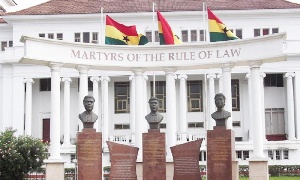- Home - News
- Elections 2024
- News Archive
- Crime & Punishment
- Politics
- Regional
- Editorial
- Health
- Ghanaians Abroad
- Tabloid
- Africa
- Religion
- Photo Archives
- Press Release
General News of Wednesday, 30 April 2025
Source: www.ghanawebbers.com
No private body deserves public power by default – Kwaku Azar slams GBA’s constitutional privilege
Professor Kwaku Azar, a legal reform advocate, has criticized the Ghana Bar Association (GBA). He argues that the GBA holds unjustified constitutional privileges. These privileges undermine democratic representation in Ghana's governance.
In his statement, part of his Governance of Ghana Organisation (GOGO) agenda, Azar described the GBA's role as an “unconstitutional monopoly.” He believes no private body should have public power by default.
Azar called for removing all references to the GBA from the Constitution. He wants provisions that allow all licensed lawyers to choose their representatives.
Currently, the GBA is a voluntary private association. It nominates members to important bodies like the Judicial Council and the National Media Commission. Azar claims this system is neither democratic nor inclusive.
He stated, “This monopoly of voice must end.” The GBA does not represent all lawyers and cannot act as their sole voice in constitutional matters.
Azar proposed immediate reforms to democratize legal representation. His suggestions include:
1. An independent legal roll of all licensed practitioners.
2. Open nominations and voting rights for all lawyers.
3. Term limits for elected representatives to prevent power entrenchment.
He emphasized that it is outdated for a private group to speak for an entire profession. Other professions do not receive similar constitutional privileges through their associations.
His comments come amid scrutiny of the GBA after its resolution on the Chief Justice’s suspension. This move has faced backlash from legal experts who accuse the association of overstepping its role.
Azar clarified that his criticism is not personal but aims to realign governance with democratic principles. He concluded, “No private body—no matter how historic—should wield constitutional power without consent from those it represents.”











